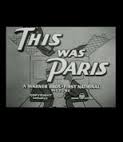
THIS WAS PARIS
UK, 1942, 77 minutes, Black and white.
Ann Dvorak, Ben Lyon, Griffith Jones, Robert Morley, Miles Malleson, Bernard Miles, Hay Petrie.
Directed by John Harlow.
This was Paris was made in London, Teddington Studios, by Warner Brothers as part of the war effort. It focuses on Paris in 1940, initially indicating that most of the citizens (many British their and the French and German sounding a touch British) were ignoring the possibilities of an invasion from Germany and that the pact could be made between the two countries. They had underestimated the presence of a fifth column which was preparing for the German presence.
The credits are interesting because of the contemporary cartoons underlying them, making fun of Hitler.
The star, Ann Dvorak, was married to British director, Leslie Fenton, and spent time in England making films and serving in the war effort as an ambulance driver – which she does in the film. American Ben Lyon portrays a newspaperman pursuing fifth columnist, agents, especially an alleged Dutch businessman, played by Robert Morley with an accent. Griffith Jones is a British intelligence officer who falls for the leading lady. Glimpses can be seen of British character actors including Miles Malleson and Bernard Miles. American singer, Elizabeth Welch, has a lavish cabaret number with orchestra and backup, reminiscent of Josephine Baker. Elizabeth Welch was to sing Stormy Weather in Derek Jarman’s The Tempest.
The brief running time is used up initially by peaceful Paris scenes and fashions but, if audiences give the film 10 minutes, it becomes a touch more interesting with the fifth column investigations. Direction is by John Harlow, British director from the 40s into the 50s of small budget films.
1. The style of war propaganda films made in the early 1940s? By American companies? In England with a principally English cast?
2. The atmosphere of Paris, 1940, detached, carefree, acknowledgement of the war but a large number of people ignoring the war? Romance, cabaret, fashions?
3. Bill Hamilton, enlisted, driving the alleged socialite, discovering that she was working for Intelligence? Ann bumping into him, fixing the car, his encounter with Butch, the drinking, the talk, take him home? Meeting Blossom, discovering Ann, going out, the quick romance, talk, dancing, cabaret? His being invited to work for Intelligence? Suspicions about Ann and the company she worked for? Talking with her, her being upset, walking away, no explanation? The sketches of guns in her file? The reassurance from the concierge about the Dutchman’s innocence? His meeting Ann again, going to work for the ambulance, his questioning her again, in the back of the van, the bombardment, hiding in the woods, the discovery of the secret compartment, the document, their attacking the man searching? Being taken by the police, the interrogation, the information about the bridges and invasion? The vehicle being commandeered, finding the circus man, walk back to Paris, refugees fleeing, going to the fashion store and seeing the German woman? Going on?
4. Ann, American, fashion designer, the firm, bumping into Bill, going out with him, quick romance, interrogation? On-again, off-again encounters? The head of the store, his persuading her to drive the ambulance? With Bill, the attack, the document, the carnival owner, the carousel, going back to Paris?
5. Butch, the American journalist, articles censored, his editor being upset, the money for the drink, meeting Bill, encountering the Dutch businessman, suspicions, interrogation that the train, the reassurance of the Dutchman as innocent? The doorman, his being a German agent, Bill attacking him?
6. The head of the firm, working with the Germans, hoping for peace pact, the ambulances, the Germans giving him money, the head of the company in Paris, her taunting him, his realising what he had done?
7. The phone calls to the Dutch businessman, the fact that he was German, cover, supplying money for the fifth column, preparing the presence of the Nazis, the interrogation and the train? The woman at the fashion shop? German infiltration?
8. The film as propaganda at the time? The wartime curiosity now?